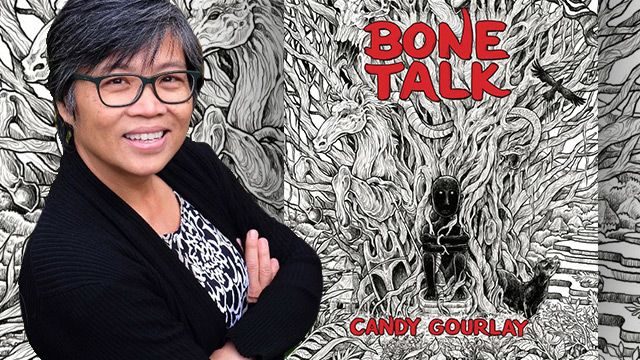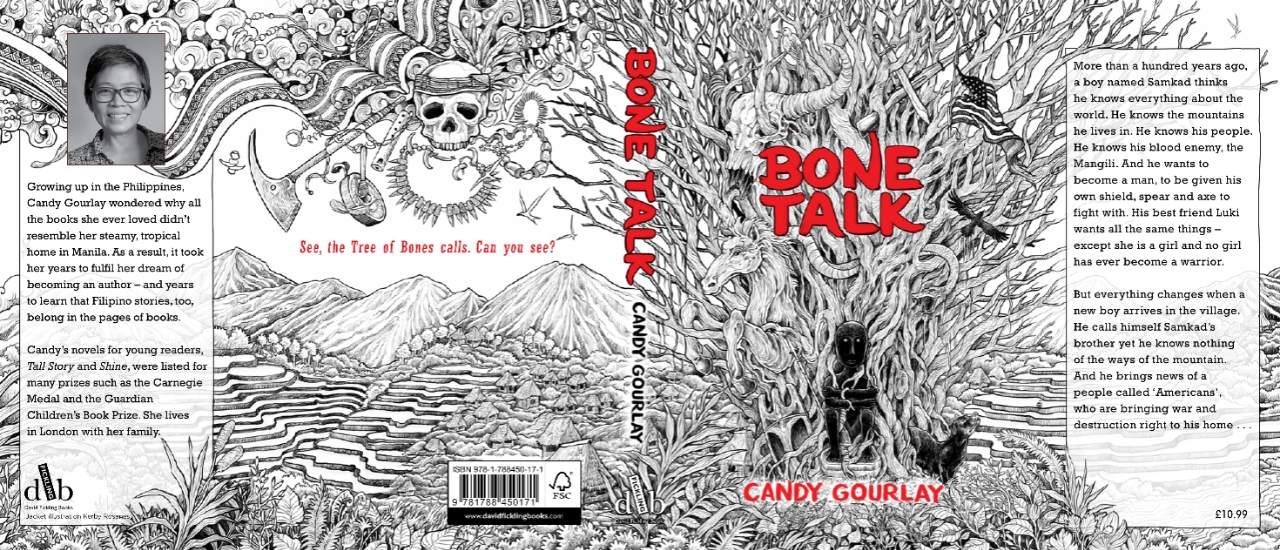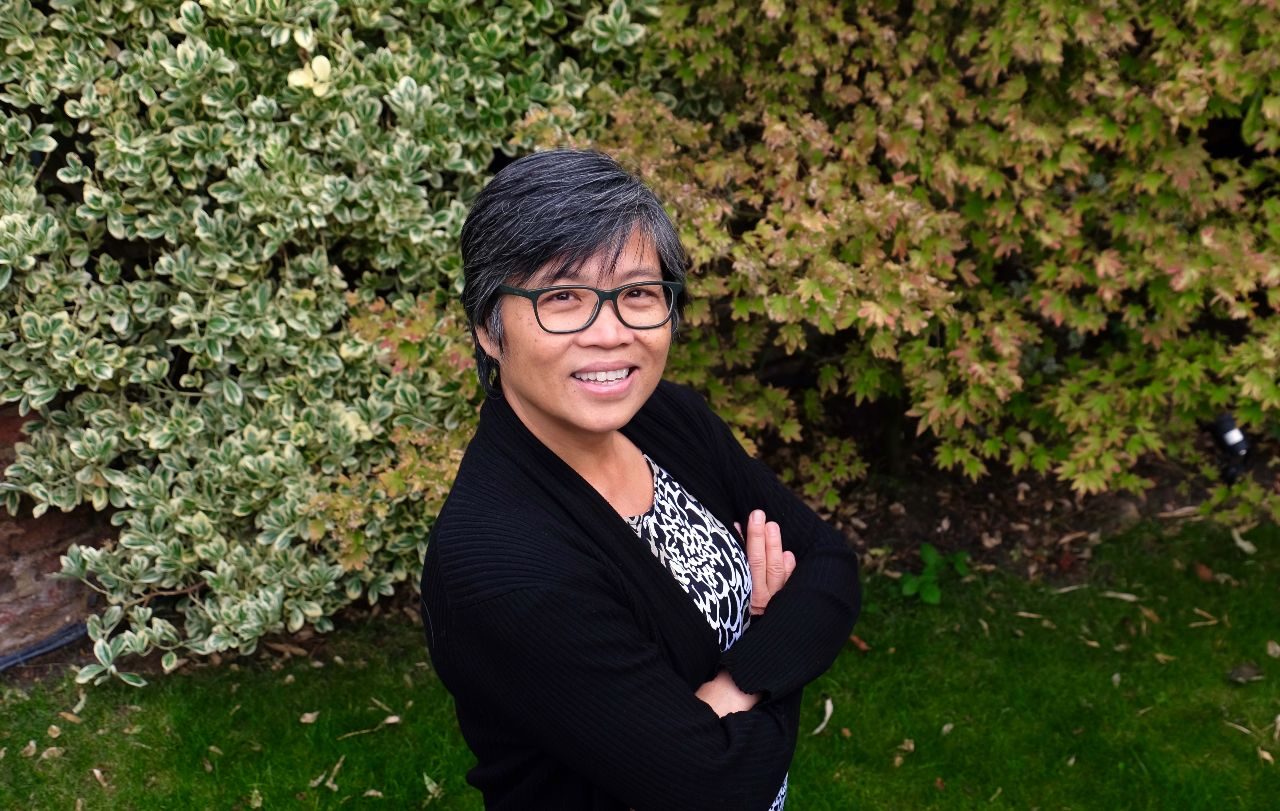SUMMARY
This is AI generated summarization, which may have errors. For context, always refer to the full article.

The next time you find yourself looking for a captivating, young adult read to pore over, head over to National Book Store, do yourself (and your kids) a favor, and grab a copy of Filipino author Candy Gourlay’s newest novel, Bone Talk.
Award-winning children’s literature writer Candy excellently weaves a tender, coming-of-age story with the rich culture of our Filipino tribe in the midst of the Philippine-American war – which is admittedly, a type of storytelling that is not usually seen on bookshelves.
However, this unfortunate reality – of why the books Candy loved as a child only showed pink-skinned children in snowy worlds and never about her tropical Manila home – is what drove her to create her special, true-to-home genre; and more specifically, her 3rd novel, Bone Talk.
What’s it about?

Bone Talk tells the story of a young boy named Samkad, who belongs to the Bontok tribe of the Cordillera region.
It’s 1899 and Samkad knows his culture, his people, and his environment by heart, as well as the Bontok manhood ritual – the ceremony that officially turns boys into tribal warriors – axes, spears, and all; the big day Samkad has been waiting for.
Samkad is confident that he’ll be the best Bontok tribal warrior he can be – until an unknown boy enters their territory, claiming to be his long-lost brother.
“The ‘Americans’ are coming,” the strange boys says. “They’ve been bringing chaos and war nearby, and they’re coming very soon.”
After that moment, everything changes, and the young protagonist begins to question everything he’s ever known.
Giving the silenced a voice
Bone Talk, which has been shortlisted for the Carnegie Medal 2019 and the prestigious Costa Book Award, sheds a crucial light on the process and effects of our colonization.
However, unlike many history textbooks, this story isn’t told through the voices of the invaders – this time, it is told through the eyes of the invaded.
“The historical materials about the Philippine-American war were all written by Americans! They presented a certain triumphalist worldview – which might not have reflected the people they had just invaded,” Candy Gourlay told Rappler.
“There were no Filipino voices in any of the books; I wanted to hear those voices that have been swamped by others in our history. I was desperate to find something that reflected the voices of these people from Bontok.”
Accounts from over a century ago are hard to find, but Candy said that she managed to find even just a hint of it during her research, which proved to be very helpful in the creation of her story.
“It was a diary of a housewife who went to Bontok in 1903 and lived there for 6 months. She kept a diary and wrote letters home and just wrote down what she saw and what people would say to her. There were little boys coming to her house every day, borrowing her books and trying to learn American words.”
“That’s when I saw the real people. They were not ‘exotic’ – they had daily mundane lives, they were very religious people. But we were also in the process of having our culture changed because of the Americans.”
Who were we?
“Who were we before this happened? What was our identity?”
Candy attempts – and succeeds – in providing literature that touches on this very important question.
Bone Talk, more than just exploring what truly “makes a man,” also delves into the clash of strong cultures, our prior ancestral beliefs, the traditions and values we upheld as a tight-knit community, and our identity as Filipinos, pre-invasion.
We emphatize with Samkad, who is in shock of suddenly being seen as “primitive” by these strangers. He begins to ask himself, “Who am I, really? Who do I want to be? Who am I in this ‘new world?'” as we also begin to do so as we turn each page.
“What happened to us as Filipinos?” Candy asks. “And we are still asking that question now.”
“We haven’t asked enough questions as a country,” Candy says.
“Why do we forget?”
Candy mentioned that one aspect of her book highlights the importance of oral tradition in keeping our stories alive – how the passing down of life experiences verbally from generation to generation ensured that everyone remembered everything, together.
“But that remembering – why did we forget? Why have we forgotten who we are?”
Candy shares that she’s heard some Americans refer to Filipinos as an “onion” – you peel and peel, until there’s nothing actually there.
“You peel away the American bit, you peel away the Catholicism bit… then what’s left?”
Our DNA, she confidently says. It’s still embedded within our identity – we still live it; we just don’t realize it.
“That’s the first thing a colonizer does – to teach us how to forget.”
Still relevant, 120 years later
At a glance, Bone Talk tells the story of our American colonization – a historical event many of us were probably taught by our Sibika, Hekasi or Araling Panlipunan teachers.
But is it really just still “in the past?” How can this piece of historical literature, according to Candy, still pose relevant to readers and citizens today?
“My wish is that people will read the story, and then ask questions,” she shares.
“I’m not offering any answers – fiction does not. It gives us a chance to explore questions, because often, there is no answer.”
Candy also wishes that the unquestioning beliefs other Filipinos may have embedded in their minds should be changed, and that children should already be taught the value of intelligent discernment as early as now.
“Life is complicated – there is no good, no bad. Learning that there’s no good and no bad means is that you don’t idolize people and see no bad in them.”
“I want my readers to ask themselves who they are,” Candy adds.
A story worth telling
Candy realizes the possible impact this story may leave on her Filipino readers – yet she makes it clear that she isn’t just writing for her country; she writes for the invaders.
“I’m not just writing for Filipinos – although they are my number one in my head – but also for the Westerners, who really don’t question where their wealth came from!”

Candy, who currently lives in England with her family, has experienced firsthand how entitlement can come so easily, especially when you’ve always been on the privileged end of the stick.
“I’m hoping there will also be some questioning from the Western readers. But, you know, it is beginning now.”
Being recognized by the Carnegie institute alone is already an astounding recognition for any author, much more Candy, whose works of fiction revolve around the Filipino identity.
“This is massive because it means that the book will remain in print. It will be read by more people than I could expect.”
And this feat is nothing short of amazing, because truly, their stories are worth telling. – Rappler.com
Bone Talk is available in all National Book Store and Powerbooks branches for only P275. It can also be ordered online on Anvil Publishing’s and National Book Store’s website.
Candy Gourlay was born in Davao City, and grew up always wanting to be a writer. She published her first middle grade novel, Tall Story – a tale about siblings in the Philippines and the United Kingdom, separated by Visa paperwork. It was nominated for the Carnegie Medal, and bagged the Waterstones, Blue Peter, Crystal Kite, and Branford Boase prizes. It also won the Philippines’ National Children’s Book award.
Her second book, Shine is a touching, ghost story that won the Crystal Kite Prize and was shortlisted for the Guardian Children’s Book Prize.
Add a comment
How does this make you feel?
There are no comments yet. Add your comment to start the conversation.